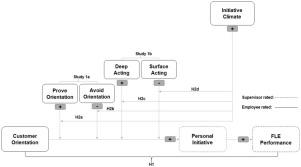Journal of Retailing ( IF 8.0 ) Pub Date : 2020-12-17 , DOI: 10.1016/j.jretai.2020.11.010 Phyra Sok , Tracey S. Danaher , Keo Mony Sok

|
Frontline employees (FLEs) — the people behind the counter, on the phone, or walking the shop floor — can profoundly affect the customer experience. Harnessing the capability of FLEs to positively shape customer experiences is critical for service firms.
However, placing the right employee in the right frontline role is not an easy task. To deliver positive service experiences, FLEs must be customer-oriented, placing customers’ interests first. In addition, FLEs need to demonstrate personal initiative by going beyond prescribed job roles to find solutions to customer problems. We propose that personal initiative is an important mediating variable in the relationship between customer orientation and FLE performance. Further, we examine whether this relationship is strengthened or weakened when a firm’s climate encourages initiative-taking behavior and FLEs have a prove or avoid orientation, or engage in deep or surface acting. We test the model across two studies using a multi-respondent data collection procedure within the retail banking sector. Our findings demonstrate that personal initiative mediates the relationship between customer orientation and FLE performance. Notably, this effect is stronger when a firm’s climate encourages initiative-taking and when FLEs have a prove orientation or engage in deep acting, and that the effect is weaker when FLEs have an avoid orientation or engage in surface acting. Our findings underscore that it is only when the fit between FLEs, their roles, and the work climate is right that firms will get the best out of their employees (c.f., Arthur et al. 2006; Kristof-Brown et al., 2005).
中文翻译:

将 FLE 的个人主动能力与其自我监管过程和公司的主动氛围相匹配
一线员工 (FLE)——柜台后面、打电话或走在车间里的人——可以深刻地影响客户体验。利用 FLE 的能力积极塑造客户体验对服务公司至关重要。
然而,让合适的员工担任合适的前线角色并非易事。为了提供积极的服务体验,FLE 必须以客户为导向,将客户的利益放在首位。此外,FLE 需要通过超越规定的工作角色来寻找客户问题的解决方案来展示个人主动性。我们认为个人主动性是客户导向和 FLE 绩效之间关系的重要中介变量。此外,我们研究了当公司的气候鼓励主动采取行为并且 FLE 具有证明或避免导向,或者从事深层或表面行动时,这种关系是否得到加强或削弱。我们使用零售银行业内的多受访者数据收集程序在两项研究中测试模型。我们的研究结果表明,个人主动性在客户导向和 FLE 绩效之间起到中介作用。值得注意的是,当公司的氛围鼓励主动采取行动时,当 FLE 具有证明导向或从事深度行动时,这种效果会更强,而当 FLE 具有回避导向或从事表面行动时,这种效果会较弱。我们的研究结果强调,只有当 FLE、他们的角色和工作环境之间的匹配合适时,公司才能充分发挥员工的作用(参见 Arthur 等人,2006 年;Kristof-Brown 等人,2005 年) . 并且当 FLE 具有避免方向或参与表面作用时,效果较弱。我们的研究结果强调,只有当 FLE、他们的角色和工作环境之间的匹配合适时,公司才能充分发挥员工的作用(参见 Arthur 等人,2006 年;Kristof-Brown 等人,2005 年) . 并且当 FLE 具有避免方向或参与表面作用时,效果较弱。我们的研究结果强调,只有当 FLE、他们的角色和工作环境之间的匹配合适时,公司才能充分发挥员工的作用(参见 Arthur 等人,2006 年;Kristof-Brown 等人,2005 年) .











































 京公网安备 11010802027423号
京公网安备 11010802027423号